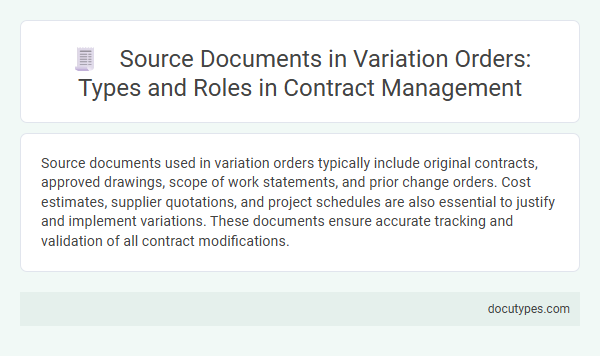Source documents used in variation orders typically include original contracts, approved drawings, scope of work statements, and prior change orders. Cost estimates, supplier quotations, and project schedules are also essential to justify and implement variations. These documents ensure accurate tracking and validation of all contract modifications.
Introduction to Variation Orders in Contract Management
Variation orders are formal amendments to the original contract scope, reflecting changes in work, cost, or timeline. They ensure that all modifications are documented and agreed upon by the contracting parties.
Source documents provide the evidence needed to justify and process variation orders efficiently. These documents include revised drawings, technical specifications, and correspondence between stakeholders.
Defining Source Documents in Contract Administration
Source documents in contract administration serve as the foundational evidence supporting variation orders. These documents detail the agreed changes and provide a clear record for verification and approval processes.
Common types of source documents include change order proposals, cost estimates, site instructions, and correspondence related to scope adjustments. These documents help track modifications from the original contract terms, ensuring transparency and accountability. You must maintain accurate and comprehensive source documents to facilitate smooth contract variations and prevent disputes.
Key Types of Source Documents in Variation Orders
What types of source documents are commonly used in variation orders? Key source documents in variation orders include contract amendments, change requests, and project specifications. These documents ensure all modifications are clearly recorded and approved, providing a reliable basis for adjustments.
The Role of Source Documents in Variation Order Evaluation
Source documents play a crucial role in the evaluation of variation orders by providing the necessary evidence to justify changes. You must rely on accurate and detailed records to ensure proper assessment and approval of any contract variations.
- Original Contract Agreement - Serves as the baseline for comparison, outlining the initial scope and terms before any variations.
- Change Requests - Documents submitted to propose modifications, detailing the nature and reason for the variation.
- Site Diaries and Progress Reports - Provide real-time data on project status and conditions influencing the variation order.
Importance of Accurate Source Documentation
Source documents used in variation orders typically include original contracts, change requests, and approval forms. Accurate source documentation ensures all modifications are clearly recorded, preventing disputes and facilitating transparent project management. Precise records also support effective cost control and timely approval processes in construction and service contracts.
Common Challenges with Source Documents in Variations
| Type of Source Document | Description | Common Challenges in Variations |
|---|---|---|
| Original Contract | Defines the baseline scope, terms, and conditions that set the foundation for variations. | Ambiguities and outdated clauses complicate interpretation during variations. |
| Change Orders | Formal documents that authorize modifications to the original contract scope or cost. | Lack of clear approval signatures or incomplete documentation leads to disputes. |
| Correspondence (Emails, Letters) | Written communication clarifies intents, agreements, and negotiations regarding variations. | Inconsistent or missing communication records challenge verification. |
| Site Instructions | Directives issued on-site to implement changes impacting contract conditions. | Poor documentation and delayed recording cause confusion about authorized changes. |
| Technical Specifications and Drawings | Detailed designs and specifications that may require adjustment due to variations. | Version control issues and unclear updates can result in incorrect execution. |
| Cost Estimates and Quotes | Financial proposals related to the changes introduced by variations. | Inaccurate or incomplete cost details hinder budget approvals and claims. |
| Progress Reports | Regular updates documenting the status of works and variation impacts. | Delayed reporting diminishes timely decision-making and dispute resolution. |
| Meeting Minutes | Official records of discussions which may include variation agreements or concerns. | Omission or unclear records reduce accountability and clarity. |
| Inspection and Testing Reports | Evidence of compliance or issues related to variation implementation. | Incomplete results or late submission weaken claims and approvals. |
| Timesheets and Labour Records | Documentation of labor inputs affected by variations. | Poor tracking or discrepancies challenge the validation of additional costs. |
You must ensure thorough collection and verification of all relevant source documents to manage variations efficiently and avoid common pitfalls.
Procedures for Submitting Source Documents
Source documents used in variation orders typically include original contracts, change request forms, and related correspondence that detail the scope modifications. Procedures for submitting these documents require thorough review and proper authorization before submission to ensure accuracy and compliance. You must follow established guidelines to present clear and complete documentation, facilitating prompt approval and processing of variation orders.
Impact of Source Documents on Contractual Claims
Source documents in variation orders include change requests, progress reports, and approved drawings. These documents provide essential evidence for validating the scope and cost adjustments in contracts.
Accurate source documents directly impact the success of your contractual claims by establishing clear proof of agreed changes. Incomplete or inconsistent documentation can lead to disputes and delays in claim settlements.
Best Practices for Managing Source Documents in Variation Orders
Source documents in variation orders are essential for verifying changes and ensuring accurate contract management. Proper handling of these documents improves transparency and reduces disputes.
- Contract Agreements - These outline the original terms and conditions, providing a baseline for variations.
- Change Requests - Official submissions that specify the nature and reason for the variation.
- Supporting Evidence - Includes emails, drawings, and cost estimates that justify the variation request.
Maintaining organized and accessible records of these documents is critical for effective project management and auditing. Ensuring your source documents are complete and up to date supports smoother approval processes and accurate financial tracking.
What Types of Source Documents Are Used in Variations Orders? Infographic

